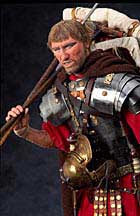Email: bshaw@princeton.edu
Website: http://www.princeton.edu/~bshaw
Background:
BA: University of Alberta '68; MA: University of Alberta '71; PhD: Cambridge
University '78
Professor Shaw works on and teaches the history of the high and later
Roman empire. His main regional focus is the North African provinces
of the empire.
He has also worked and published on the demography and social history
of the Roman family. His current research interest is the problem of
sectarian violence in Christian communities in Africa in the age of Augustine.
He has published articles in all of these areas and, more recently, a
sourcebook on Spartacus and the Slave Wars. He is also currently
involved in the first volume of Worlds Together, Worlds Apart,
a new world history
text that is being written by faculty in the Department of History at
Princeton.
Recent articles:
“War and Violence,” [in] G. W. Bowerwock, Peter Brown & Oleg Grabar eds., Late
Antiquity: A Guide to the Postclassical World, Cambridge, Mass. – London,
Harvard University Press (1999), pp. 130-69 [revised version [in] G. W.
Bowersock, Peter Brown & Oleg Grabar eds., Interpreting Late Antiquity:
Essays on the Postclassical World, Harvard, Havard University Press (2001),
130-69]
“The Seasonal Birthing Cycle of Roman Women,” chap. 2 [in] W. Scheidel ed.,
Debating Roman Demography, Leiden, Brill (2000), pp. 83-110
“Rebels and Outsiders,” chapter 11 [in] A. K. Bowman, P. D. A. Garnsey &
D. Rathbone eds., The Cambridge Ancient History, vol. 11: The High
Empire, A.D. 70-192, Cambridge, Cambridge University Press, 2000,
pp. 361-403.
“Raising and Killing Children: Two Roman Myths,” Mnemosyne: A Journal of
Classical Studies vol. 54 (2001), pp. 31-77
“Challenging Braudel: A New Vision of the Mediterranean,” Journal of Roman
Archaeology, vol. 14 (2001), pp. 19-53 [review article of P. Horden & N.
Purcell, The Corrupting Sea: A Study of Mediterranean History, Oxford,
Blackwell, 2000]
“Räuberbanden,” [in] Der Neue Pauly: Enzyklopädie der Antike, vol. 10 (Stuttgart-
Weimar, 2001), cols. 758-63
“’With Whom I Lived’: Measuring Roman Marriage,” Ancient Society, vol. 32 (2002),
pp. 195-242
“Judicial Nightmares and Christian Memory,” Journal of Early Christian Studies,
vol. 11 (2003), pp. 533-63
“A Peculiar Island: Maghrib and Mediterranean,” Mediterranean Historical Review,
vol. 18 (2003), pp. 93-125
“Who Were the Circumcellions?” chap. 11 [in] A. H. Merrills ed., Vandals,
Romans and Berbers: New Perspectives on Late Antique Africa (London,
Variorum, 2004), pp. 227-58
“Seasonal Mortality in Imperial Rome and the Mediterranean: Three Problem
Cases,” chap. 4 [in] Glenn R. Storey ed., Urbanism in the Preindustrial World:
Cross-Cultural Approaches (Tuscaloosa, The University of Alabama Press,
2006), pp. 86-109
Brent Shaw

 Professor Feeney teaches in the area of Latin poetry in particular, and has published two books on the interaction between Roman literature and religion (The Gods in Epic; Literature and Religion at Rome), with another on Roman representations of time (Caesar's Calendar). He is currently working on a book tentatively entitled Roman Horizons, on the way the Romans modernised themselves in the third and second centuries BCE.
Professor Feeney teaches in the area of Latin poetry in particular, and has published two books on the interaction between Roman literature and religion (The Gods in Epic; Literature and Religion at Rome), with another on Roman representations of time (Caesar's Calendar). He is currently working on a book tentatively entitled Roman Horizons, on the way the Romans modernised themselves in the third and second centuries BCE. B.A. Toronto ’70, D.Phil. Oxford ’76.
B.A. Toronto ’70, D.Phil. Oxford ’76. Professor Baraz specializes in Latin literature and Roman culture. She is interested in how literary texts shape, and are in turn shaped by, social and cultural forces. She is currently completing a book manuscript entitled Cicero's Philosophical Politics that locates the body of philosophical work Cicero produced in the 40s BCE under Caesar's dictatorship in its historical and cultural context. She is also working on a new project that explores the meaning of pride and related concepts in Roman society (a paper on this subject is forthcoming in "Kakos": Badness in Classical Antiquity, Ralph Rosen and Ineke Sluiter, edd., Brill 2008).
Professor Baraz specializes in Latin literature and Roman culture. She is interested in how literary texts shape, and are in turn shaped by, social and cultural forces. She is currently completing a book manuscript entitled Cicero's Philosophical Politics that locates the body of philosophical work Cicero produced in the 40s BCE under Caesar's dictatorship in its historical and cultural context. She is also working on a new project that explores the meaning of pride and related concepts in Roman society (a paper on this subject is forthcoming in "Kakos": Badness in Classical Antiquity, Ralph Rosen and Ineke Sluiter, edd., Brill 2008).



